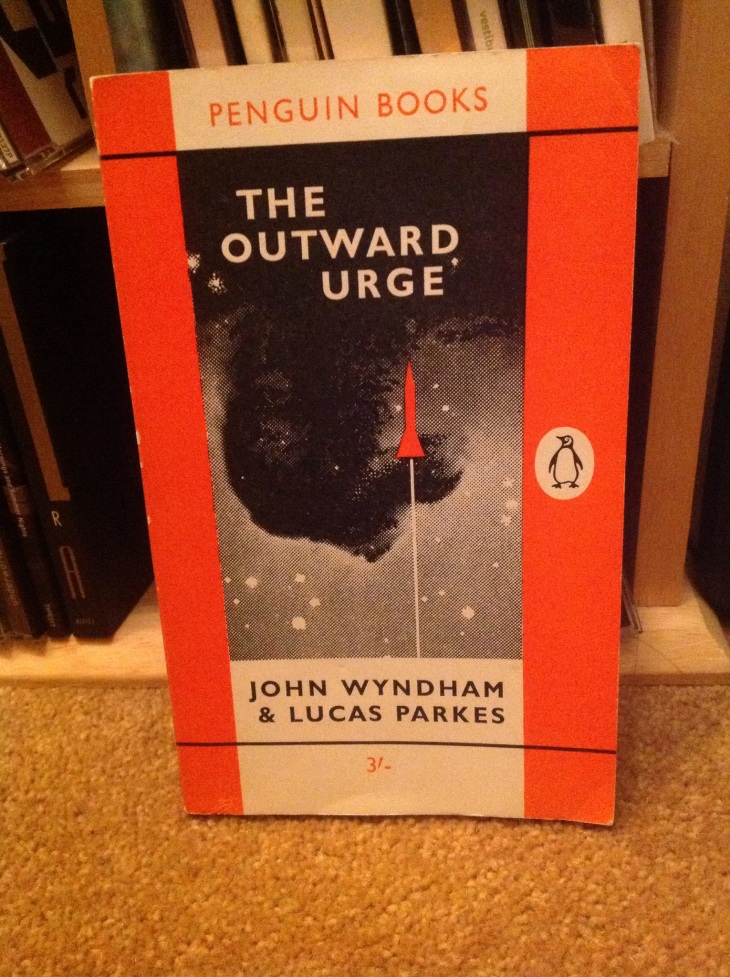Is it fair to review a book over 50 years after it was published, especially when it is science- fiction? Stories set in the not too distant future are bound to cause wry smiles from the readers living in the time they are set who are likely to see the writers predictions as naive or possibly hopelessly optimistic. Remember the debate during 1984 (if you were around then) about George Orwell.
I’m not sure I can do this book justice from my vantage point, but as I am writing reviews on all of the books I read I will give it a go.
I love John Wyndham’s novels so when I spotted this one in a second-hand bookshop, I snapped it up. It was in pretty good condition for paperback of its age. The previous owner, a Mr Rodney Cooper of Wimbledon had left his name and address label on the inside cover. Well done to Mr Cooper for taking care of it so well.
Whilst the book gives the usual potted biography of John Wyndham there is very little information about Lucas Parkes other than he acted as technical adviser.
The first four chapters of the book were originally published in 1959, with the fifth and final chapter being added in 1961. It does read as a series of short stories rather than as a novel.
The stories all feature successive generations of the Troon family as they follow their seemingly genetically inherited desire to explore space. George Montgomery Troon, otherwise known as “Ticker”. (His initials are GMT geddit!) is involved in the construction of the first space station and strives to save it from a sabotage attempt. The saboteurs are not identified but as it was written during the Cold War the assumption is that is a Soviet plot.
The Cold War comes to a thermonuclear conclusion in the second chapter in which Ticker Troon’s son commands the British Moon Station. This story is probably the best in the book but hardly measures up to Wyndham’s better known works. As opposed to some other sci-fi writers of the time who thought, or hoped, that space exploration would be funded as a result of humankind’s insatiable scientific curiosity, Wyndham views the colonisation of the Moon a least as a political and military strategy which seems more realistic. Manned exploration of space in the future will need something more than simple scientific curiosity to persuade governments to allocate the vast resources that will be needed to fund it.
Obviously this was written well before the Moon landings and so it’s easy for a smile to develop when reading some of the descriptions of how men live in space. Most people seem to smoke, presumably Lucas Parkes as technical adviser thought that was reasonable.
The third and fourth chapters cover the expanding Troon clan’s onward exploration of Mars and Venus. Following the massive nuclear war in chapter two, Brazil appears to have become a global superpower with a large space exploration programme. Given that Brazil found it difficult to get football stadia built on time for the World Cup and that there were street riots protesting about the amount spent on the tournament this caused my eyebrows to raise slightly. But what do I know, the final chapters are set in 2094 and 2144 respectively so Wyndham might be right yet.
The language used by the characters throughout is very much of its time. Even when the Troon’s are on Venus the dialogue made me think of RAF pilots in a war movie. Language develops quickly and one cannot criticise a writer for failing to predict how people would talk in the future. It would be ridiculous to expect them to try. However the dialogue does tend to jar when you are trying to imagine a futuristic scene.
Even though the last two chapters were fairly short, indeed the whole book is only 187 pages long, I did find it difficult to generate the enthusiasm to plough on through. The book lacks an overarching storyline and the fact that the stories are linked by successive generations of one family does not provide and adequate replacement for a cohesive plot. The characters are pretty flat and uniform. It is hard to distinguish successive generations of Troons from the original Ticker Troon. It is harder still to care about any of the characters. The book ends on Venus on 2144 but there is no real conclusion. You feel that it could carry on and on with space-family Troon happily colonising successive planets in the solar system and sparking up a fag on landing.
It’s disappointing to have to be so negative about this book. I’ve really enjoyed other Wyndham novels like Chocky, The Kraken Wakes and, of course, The Day of the Triffids. Although these novels contain less believable scenarios than the exploration of space they are far more gripping, have better characters and say more about the human spirit.

I’m ploughing my way through this at the moment, and concur totally with your review. Spot on. Definitely not one of Wynham’s best!
LikeLiked by 1 person